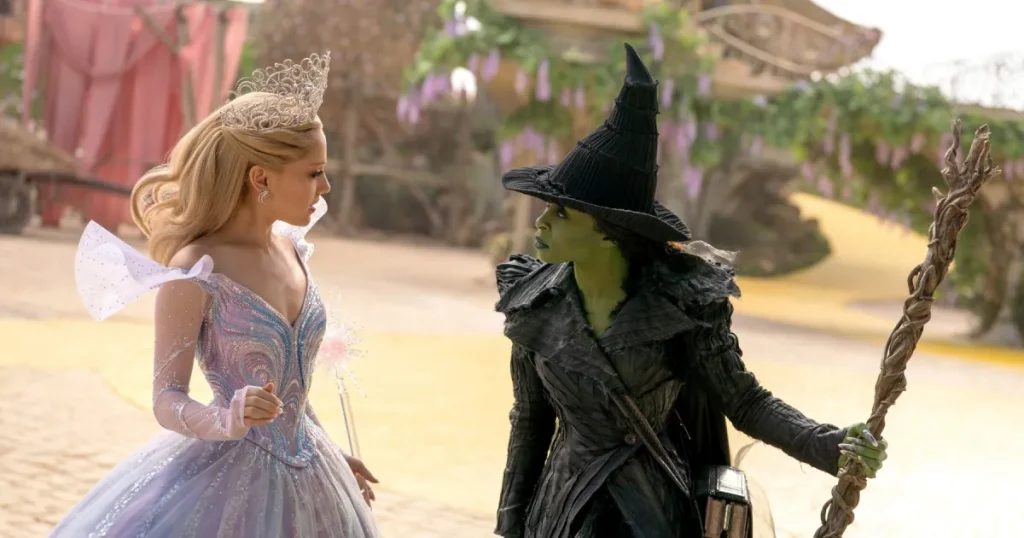A Mom’s Stand: The Social Media Influencer Who Walked Out of “Wicked: For Good”
In the age of instant social media reactions, Sara Burnett, a self-described “virtual hope spreader” and “anchor in Christ,” has ignited a passionate online debate after publicly documenting her decision to leave a screening of “Wicked: For Good” with her children. On November 24, Burnett reinforced her stance on Instagram Stories, sharing Us Weekly’s coverage of her walkout while declaring, “We will never always make the right choices but when in a situation where you can make a choice to stand for your beliefs… do it.” The day before, she had posted a more detailed critique of the film, explaining her family’s love for theater and musicals but drawing a firm line at content she felt contradicted her values. Sitting in her car, sipping from a Stanley cup in the accompanying video, she expressed particular concern about scenes she described as “casting legit spells” and depicting men “sexually taking off women’s clothing,” with music referencing characters “laying in bed together.” Her motherly instincts kicked in when she noticed her children, including her 5-year-old, looking uncomfortable: “The mom gut knew it was time to walk out.”
Burnett’s objections centered specifically on what she perceived as genuine spellcasting elements in the film, not merely theatrical fantasy. “Feeling that the spells cast in this movie weren’t just some made up words… they had purpose in them!” she wrote, referencing biblical guidance to “stay far away from that.” Her concerns extended to a romantic scene between the characters Fiyero (played by Jonathan Bailey) and Elphaba (Cynthia Erivo), where the shirtless male lead and the female protagonist (wearing what Burnett noted was a “chunky gray cardigan sweater”) sing the love duet “As Long As You’re Mine” in Elphaba’s hideaway. This scene, along with the magical elements, proved to be the breaking point for Burnett, who decided these themes weren’t appropriate for her young viewers despite the film’s PG rating from the Motion Picture Association, which indicated “action/violence, some suggestive material and thematic material.”
This personal parenting decision quickly transformed into a larger cultural conversation about values, entertainment choices, and how families navigate media content in today’s world. While many of Burnett’s followers supported her stance, agreeing with her right to protect her children from content that conflicted with her religious values, others questioned her approach. Some commenters pointed out that research before attending might have prevented the uncomfortable situation entirely: “You had every opportunity to do your research on whether the content aligned with your values before allowing your kids to even see part 1. Ridiculous.” Others shared contrasting experiences, with one parent noting, “So happy I took my kids to see it! They’re too little to read into any of it and they see all that stuff as icky anyways. My kids will grow up not hiding and having life normalized. So happy for them.” These divergent perspectives highlight the deeply personal nature of parenting decisions around media consumption.
Meanwhile, “Wicked: For Good,” the much-anticipated sequel starring Ariana Grande and Cynthia Erivo, has been embraced by general audiences with considerable enthusiasm. The film dominated its opening weekend box office after premiering on November 21, generating an impressive $150 million domestically and $226 million worldwide. Industry newsletter The Ankler reported that opening-night audiences awarded the film an “A” CinemaScore rating, suggesting strong viewer satisfaction. Demographic data revealed that 61 percent of moviegoers were between 18 and 34 years old, with 70 percent being female—reinforcing the growing recognition that films targeting female audiences can achieve remarkable commercial success. This warm reception stands in stark contrast to Burnett’s experience, illustrating how the same content can be received very differently depending on personal values, expectations, and beliefs.
The incident raises broader questions about the relationship between entertainment, parental guidance, and personal values in contemporary society. For some families, the fantasy elements of witchcraft in stories like “Wicked” represent harmless theatrical imagination—creative expressions disconnected from real-world spiritual concerns. For others, like Burnett, these depictions cross meaningful boundaries, particularly when children are involved. Similarly, romantic scenes that might seem tastefully restrained to some viewers can appear inappropriately suggestive to others. The conversation around Burnett’s decision reveals how entertainment choices have become another arena where differing worldviews and parenting philosophies intersect, sometimes contentiously, in the public square. The Motion Picture Association’s ratings system attempts to bridge these divides by providing guidance, but ultimately cannot account for the wide spectrum of family values and sensitivity thresholds.
What makes Burnett’s story particularly notable is not just her decision to leave the theater, but her choice to share that decision publicly on social media, inviting both support and scrutiny. As an influencer with a platform centered on faith and family values, her public stand represents more than a personal choice—it becomes a statement about what content aligns with the values she promotes. The subsequent online discussion demonstrates how entertainment consumption has become increasingly tied to identity and values signaling in our digital age. Some applauded Burnett for modeling conviction-based decision making for her followers, while critics questioned whether a more private approach might have better served her children. In either case, the incident reveals how even a family trip to the movies can become a flashpoint in ongoing cultural conversations about faith, entertainment, parenting, and the ever-blurring boundary between private choices and public discourse in our social media-saturated world.


